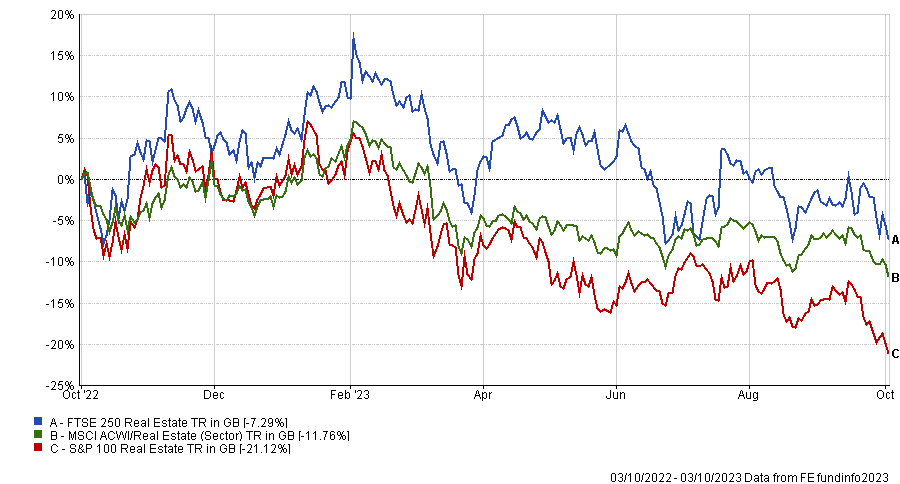High interest rates have turned property companies into some of the most undesirable holdings, but now is an attractive entry point, according to Matthew Tillett, manager of the Premier Miton UK Value Opportunities fund.
The FE fundinfo Alpha Manager said interest rates have hampered “rate-sensitive cyclicals”, which includes companies in the housing, building, listed property and real estate sectors.
He described them as “so out of favour” due to rising rates, arguing that these sectors in particular were on more “severe” discounts than other areas of the market.
Indeed, any companies related to property have been some of the worst affected by high interest rates, with indices such as the S&P 100 Real Estate, MSCI ACWI Real Estate and FTSE 250 Real Estate sectors sinking 21.1%, 11.8% and 7.3% over the past year.
Total return of indices over the past year

Source: FE Analytics
“That's always very interesting, because when I see a sector that is implying a much worse outcome than everywhere else, it tells me that investors have just completely given up, when it's actually a lot more interesting than it looks on the surface,” said Tillett.
As such, he has upped the Premier Miton UK Value Opportunities fund’s exposure to the sector to 9.4% since taking over the £329m portfolio last year, choosing to offload some Covid losers that have now recovered.
He removed companies such as manufacturer Melrose, which was trading cheaply when it was unloved during the pandemic and has since made a sharp recovery, to create room for the property stocks.
The reason this area remains so unloved, he said, is because investors are “far too focused on macroeconomics” and whether there will be a recession, when they should be looking at “individual industries in their own their cycles and the specific companies within that”.
This indiscriminate selling has created an opportunity for Tillett to buy businesses that have been dragged down unfairly among the mass of downgrades.
Along with interest rates, a big cause for investor concern is offices, which have become less used in the post-Covid world of hybrid working.
However, Tillett said this only accounts for a small part of the sector (6.8% of the MSCI ACWI IMI Core Real Estate index for example), meaning there are “loads of property companies aren't involved in offices whatsoever”.
Schroders’ head of global solutions, Kieran Farrelly, said globally the asset class has been under fire due to the “challenged US office sector”, but said the property was “far more than US offices”.
Despite his optimism, Tillett did warn that property stocks could continue to fall for the foreseeable future as central banks are expected to raise interest rates again and maintain them at high levels through to next year, which could continue to leave the sector out of favour.
“We’ve been early with this,” Tillett added. “We’ve not had any reporting issues from any of these companies since we started buying them, but the market is not rewarding them at this stage.
“I think once we get through this period and get some clarity on inflation and interest rates, people will be surprised, but it will probably continue to be range bound until then. It will probably take a while for that to materialise, but in the meantime we're pretty well compensated for it because the valuation is so low.”





